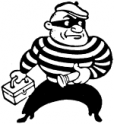Stand chickie
I’ll wait in the car.
Dear Word Detective: In reading Donald E. Westlake’s classic crime novel Good Behavior for the fifth time, I noticed a phrase that hadn’t caught my eye before — “stood chicky,” in a context that implies the individual in question was serving as a lookout. I haven’t found a clear definition of this phrase, although several other examples (some spelled “chickie”) pop up via search engine. Can you enlighten us on its origin? — Bob Armstrong.
Fifth time, eh? Maybe I should read it. I figure that if someone not overtly crazy (and obviously you’re not) reads something over and over again, it must be worth reading at least once. On the other hand, I once had a friend who was obsessed with Malcolm Lowry’s novel “Under the Volcano” and seemed to read it about every six months. I think you only have to read Under the Volcano once to know how weird that is.
I hadn’t run across “stand chicky” before I read your question, but it seemed likely to me that the phrase probably harbors a chicken somewhere in its family tree. After all, English has dozens of phrases and metaphors honoring our little feathered pals. Unfortunately, our linguistic tributes to what the Oxford English Dictionary calls “the domestic fowl” are rarely complimentary. As I noted about a year ago while discussing “chicken pox,” when we notice the less attractive aspects of our own nature, we pin it all on the poor chicken, the Rodney Dangerfield of the animal world. We call those without courage “chicken-hearted,” “chicken-livered,” or just plain “chicken.” We deride small amounts of money as “chicken feed” and when we call someone a “chickenhead,” we mean “dolt.”
More to the point of your question, “chick” and “chickie” have long been used as demeaning slang terms for young women and girls. Assuming that acting as the lookout is the least confrontational role in a criminal gang pulling some sort of “job,” it seems possible that “standing chickie” might be a reference to this role usually being given to female members of the group, perhaps a mocking jibe at men assigned lookout duty. Makes perfect sense to me.
Fortunately, my little theory is all wet, and the truth is far more interesting. To “lay” or “play” or “stand chickie” has meant “to act as lookout” since at least the 1930s in the US, and comes from the use of the cry of “Chickie!” as a warning of the approach of the police or similar authorities (“Chickee the cop, behin’ de rock,” Roth, Call It Sleep, 1934). The word “chickie” in this use is a variant of the equivalent cry “chiggers!”, which is itself a modification of “jiggers,” which dates back to at least the 1890s. “Jiggers!” was used as a cry to warn of approaching authority, but it was also an all-purpose interjection to express surprise or shock, and may have begun as a euphemism for “Jesus.” Interestingly, the somewhat older (early 1800s) underworld expression “cheese!” or “cheese it!”, also meaning “Beat it, here come the cops,” sounds as if it too might have begun as a euphemistic alternative to “Jesus.”
Page 1 of 2 | Next page

